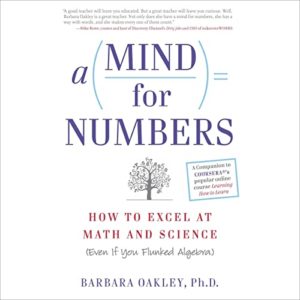
 A Mind for Numbers: How to Excel at Math and Science (Even If You Flunked Algebra) is an excellently constructed tour of the mind improving your approach to learning and problem-solving. While there are many learning strategy books out there, Barbara Oakley’s stands out due to its entertaining, educational, well-researched, and refreshed cognitive foundation. You are in for a real treat as each bite-sized chapter draws you in with engaging stories, enticing your curiosity with cognitive principles and historical tidbits asking you to constructively reflect on the machinery of your mind.
A Mind for Numbers: How to Excel at Math and Science (Even If You Flunked Algebra) is an excellently constructed tour of the mind improving your approach to learning and problem-solving. While there are many learning strategy books out there, Barbara Oakley’s stands out due to its entertaining, educational, well-researched, and refreshed cognitive foundation. You are in for a real treat as each bite-sized chapter draws you in with engaging stories, enticing your curiosity with cognitive principles and historical tidbits asking you to constructively reflect on the machinery of your mind.
While this book says it is for Math and Science learning, the concepts addressed here can be applied to a wide array of subjects from language learning to time management, procrastination, and reading. Although it is filled with useful and updated information about how memory works, it is not simply a book about memory techniques. Throughout, there is a continual nod to social-emotional learning concepts and metacognitive awareness, including understanding how the ways you are learning may lead you to develop a false sense of confidence in your knowledge. Enabling you to understand your own learning profile, Oakley shares both what is effective and what is not effective, making it a great book for study skills classes or anyone who just wants to identify what learning practices are helpful and which ones are simply a waste of time.
Faithful to its inner teachings, the book is organized into very useful chunks of information that allow the reader to build their stores of knowledge in a systematic way. Each chapter is packed with great lessons followed by a “Pause and Recall” section and containing “Now you try” sections, encouraging us to pull away from the reading for a moment and relate the concepts to our lives and process them at more meaningful and deeper levels. We also get nice neat summaries pulling the chapters together integrating across chapters and allowing for a quick skim of some of the highlights. This structure naturally lends itself to classroom discussions. As an instructor, I have even used some of the “Now you try” sections with my college students who find them to be useful and revealing reflections.
Illuminating the intriguing history of psychology, we are treated to fascinating discussions of real people including arsenic eaters, a man who had an unnatural ability to remember details at some cost to other cognitive abilities, and an infamous neuroscientist who was put into jail for building a small cannon that destroyed a neighbor’s gate. These little bits of historical psychology are a gateway for the psychology novice to enter the field and engage students. These morsels from history led me to also jump on the internet and learn a bit more about these characters, demonstrating Oakley’s ability to open up new worlds.
I would be leaving out an important part of this book if I did not mention the memorable, fun, and useful visuals in this book. I’m particularly fond of the octopus representing attention mechanisms in the brain and pinball machines representing the semantic closeness of ideas. When discussing the removal of faint connections, we are offered illustrations of ‘metabolic vampires’ that suck the remaining life from neurons¬–images that really leave a lasting impression. The creative use of these and other metaphors throughout the book will help the novice student grasp the concept and act as useful teaching tools for the instructor to reframe the concept and make it accessible while staying true to the science. While the metaphors and illustrations are fun, they are not diminutive. The reader never feels talked down to, and the material is not oversimplified.
From mathematics to learning a new hobby and managing your life, Oakley enhances the learning experience and makes you the game-maker in your learning adventure. She makes learning fun and you will walk away with a growth mindset and new tools opening your mind to try or try again to learn concepts you thought were out of your reach–’even if you flunked algebra.’




